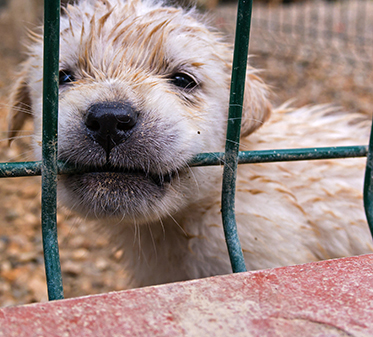Recently the Washington Post investigated the alarming practice of so-called “rescue” groups buying puppies at auction from commercial breeders, known as puppy mills.
Here’s what we know about the puppy mill industry: Nearly all pups that come from a commercial breeder are the result of emotional and physical torture. Breeder dogs are kept in cruel conditions: tiny, dirty, wire-bottom cages, where they are treated as machines of production, churning out litter after litter. They receive no human companionship or comfort. They are barely able to move, let alone run or play. A sickening joke played on “man’s best friend.”
 Here’s what we know about businesses that profit off of animals: If there is money to be made, the practice will continue. Because it may cut into profits, compassion and quality care will only be applied if required by law, customers and/or public pressure. Like buying a fur coat, buying dogs from puppy mills just feeds the greedy beast of animal cruelty.
Here’s what we know about businesses that profit off of animals: If there is money to be made, the practice will continue. Because it may cut into profits, compassion and quality care will only be applied if required by law, customers and/or public pressure. Like buying a fur coat, buying dogs from puppy mills just feeds the greedy beast of animal cruelty.
Here’s what we know about the animal welfare industry: There is NO regulation of rescue groups. Anyone can call themselves a rescue. Of course, there are many amazingly selfless people in animal rescue doing wonderful work, but there are also hoarders and charlatans galore. Sixty percent of people charged with hoarding call themselves “rescues.” And now we have people who flagrantly manipulate the animal-loving public with words like “rescue” and “saved” so that they can buy and sell expensive breeds of dogs for personal gain.
“Adopt, don’t shop” has become a strong national value. That is an incredible thing. The public’s growing willingness to adopt homeless animals has helped dramatically reduce shelter euthanasia. But it should also be driving down the puppy mill business. Instead, the unscrupulous are helping puppy mills flourish by bringing in tons of cash from swindled donors.
It is true that in certain parts of the country the homeless dog population has decreased through adoption and sterilization, leaving few puppies for those who prefer to adopt young animals. But there is no shortage that supports the need for puppy mills. There will always be unwanted and abandoned animals left at shelters, and there are many places across the country still drowning in puppies and kittens needing homes.
We at HSHV are very fortunate to have a record-high adoption rate and local pet sterilization rate that allows us to make room for animals from places without such fortune. Our Love Train program gives animals from over-crowded shelters a “ticket” (possibly their only way out alive) to HSHV and into a loving home.
Rest assured, HSHV never pays people to breed, and we don’t buy animals. Driving up the demand to create more, in torturous conditions no less, when there is already a surplus is counter to everything we stand for.
We are so grateful for animal lovers who want to help animals in need. But it’s important to do your homework before supporting any animal group. And no matter where you acquire your companion animal, be absolutely sure to see the care of the animals firsthand so that you don’t accidentally feed the beast of animal cruelty.



